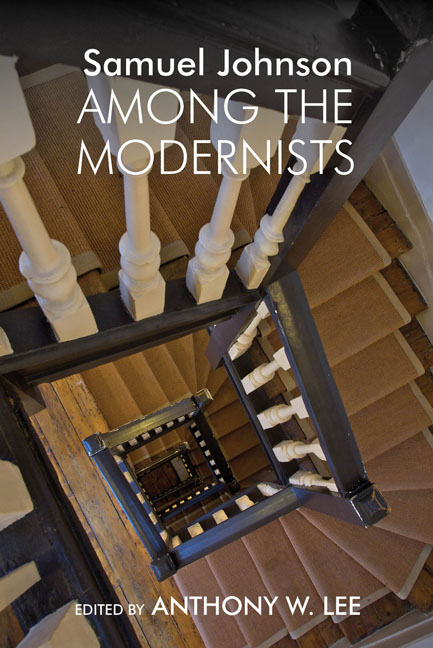Book contents
- Frontmatter
- Contents
- Acknowledgments
- Short Titles
- Abbreviations
- Introduction: Modernity Johnson?
- 1 Johnson, T. S. Eliot, and the City
- 2 “Saint Samuel of Fleet Street”: Johnson and Woolf
- 3 “Intellectually ‘Fuori del Mondo‘”: Pound's Johnson
- 4 The Antinomies of Progress: Johnson, Conrad, Joyce
- 5 Johnson Goes to War
- 6 Samuel Beckett and Samuel Johnson: Like-minded Masters of Life's Limitations
- 7 The “Plexed Artistry” of Nabokov and Johnson
- 8 Johnson and Borges: Some Reflections
- 9 Ernest Borneman's Tomorrow Is Now (1959): Thoughts about a Lost Novel, with Glances toward Samuel Johnson and other Modernists
- Notes
- Contributors
- Index
1 - Johnson, T. S. Eliot, and the City
- Frontmatter
- Contents
- Acknowledgments
- Short Titles
- Abbreviations
- Introduction: Modernity Johnson?
- 1 Johnson, T. S. Eliot, and the City
- 2 “Saint Samuel of Fleet Street”: Johnson and Woolf
- 3 “Intellectually ‘Fuori del Mondo‘”: Pound's Johnson
- 4 The Antinomies of Progress: Johnson, Conrad, Joyce
- 5 Johnson Goes to War
- 6 Samuel Beckett and Samuel Johnson: Like-minded Masters of Life's Limitations
- 7 The “Plexed Artistry” of Nabokov and Johnson
- 8 Johnson and Borges: Some Reflections
- 9 Ernest Borneman's Tomorrow Is Now (1959): Thoughts about a Lost Novel, with Glances toward Samuel Johnson and other Modernists
- Notes
- Contributors
- Index
Summary
Now Johnson was, in his day, very much a modern; he was concerned with how poetry should be written in his own time.
T. S. Eliot, Milton (1947), 2.A literary scholar spending years in the company of Laurence Sterne will, if only as a defense mechanism against the many assertions of Sterne's anticipation of postmodernism, find himself arguing for his far more interesting, if less obvious, relationship to modernism. Hence, in a series of essays over the years, I have brought Sterne's writings into proximity with the novels of Marcel Proust, Italo Svevo, Bruno Schulz, and Virginia Woolf; with the philosophy of Friedrich Nietzsche; and with the autobiographical Sentimental Journey of Viktor Shklovsky—an erratic but sufficiently representative sampling of the modernist movement. What I learned from these excursions, however, was not only that Sterne anticipated modernism, or that the predilection among modernists for Sterne's writings (several were enthusiastic admirers) was of particular importance to their own endeavors but that great authors of any era and any “ism,” when placed in proximity by attentive readers, will be overheard engaging in conversations well worth chronicling.
For example, when reading Tristram Shandy alongside Mrs. Dalloway I believe I heard a conversation between the two works about the modern worship of proportion, order, and unstoppable progress through science and technology. Herself a reader of Sterne, moreover, Woolf had a different conversation with him, one sufficient to induce her to write an introduction to an edition of A Sentimental Journey that is still a very valuable commentary on that work. On the other hand, the Polish writer Bruno Schulz might never have encountered Sterne, but a reader putting his work in proximity with Sterne's may well hear the two authors speaking to one another across languages, countries, and generations. This conversation among the best authors is, I believe, what too many teachers of literature have tended to ignore in a postmodernist era dominated by socially and politically determined reading lists alongside a desire to eschew all that is past in order to emphasize their own agenda of freedom and nonjudgmental evaluation. Modernism, I would argue, instinctively and pervasively sensed and addressed the hazards of leaning too far forward without also looking back.
- Type
- Chapter
- Information
- Samuel Johnson Among the Modernists , pp. 21 - 40Publisher: Liverpool University PressPrint publication year: 2019



